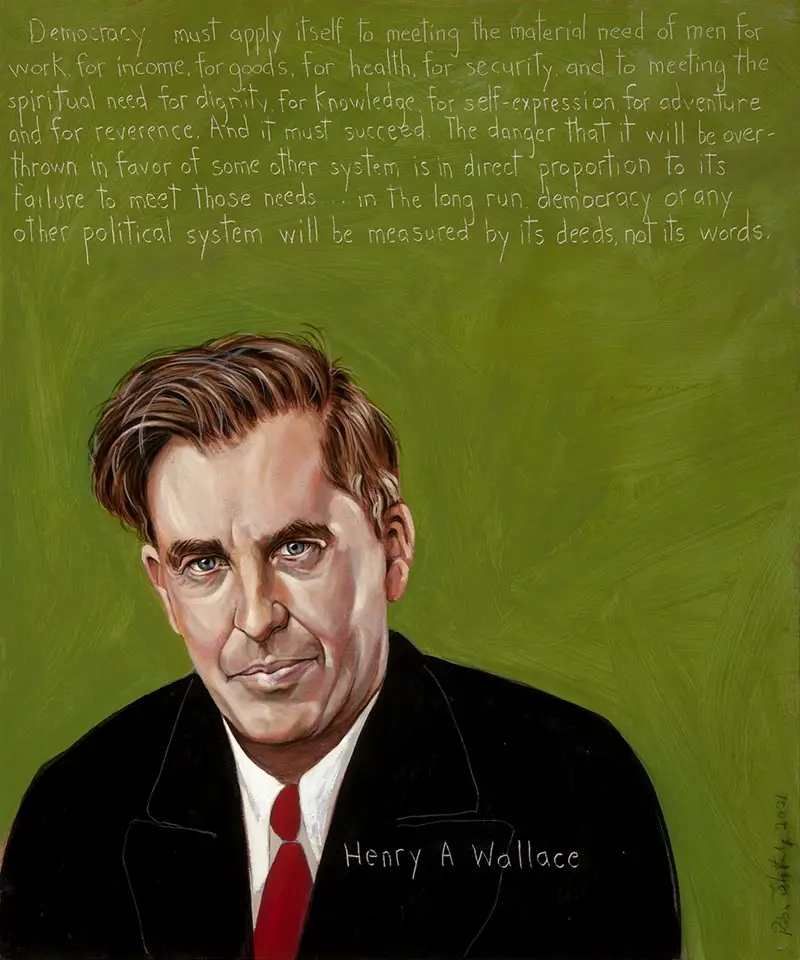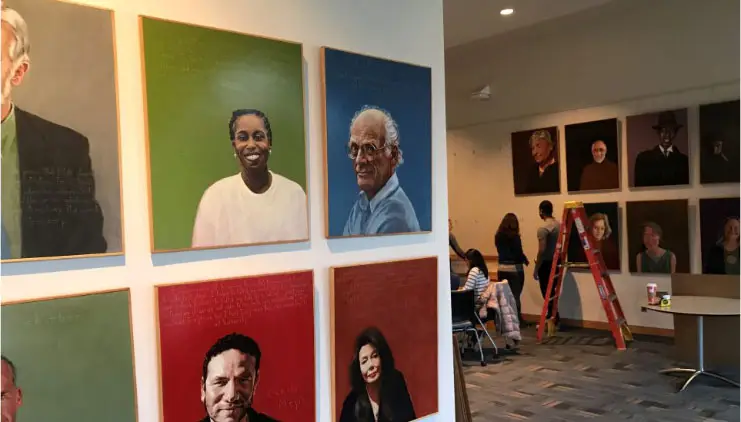
Henry A. Wallace
U.S. Vice President, peacemaker, progressive thinker, public servant : 1888-1965
“Democracy . . . must apply itself to meeting the material need of men for work, for income, for goods, for health, for security, and to meeting their spiritual need for dignity, for knowledge, for self-expression, for adventure and for reverence. And it must succeed. . . . The danger that it will be overthrown in favor of some other system is in direct proportion to its failure to meet those needs. . . . In the long run, democracy or any other political system will be measured by its deeds, not its words.”
Biography
Secretary of Agriculture, Vice President, and Secretary of Commerce in the Franklin D. Roosevelt administration
Developer of hybrid corn varieties
Magazine and newspaper writer and editor
Presidential candidate for the Progressive Party
Goodwill ambassador and champion of world peace
Henry A. Wallace was committed to progressive democracy in the United States and international cooperation toward peace and human rights. Toward the end of World War II, he wrote, “When the time of peace comes, the citizen will again have a duty . . . the supreme duty of sacrificing the lesser interest for the greater interest of the general welfare. Those who write the peace must think of the whole world. There can be no privileged peoples.”
Wallace was born in Adair County, Iowa, in 1888. His father, Henry Cantwell Wallace, was the secretary of agriculture under Warren G. Harding and Calvin Coolidge. Wallace’s grandfather, Henry Wallace, edited the agricultural newspaper The Iowa Homestead, then published Farm and Dairy, which he transformed into Wallaces’ Farmer in 1898. Wallace’s parents encouraged his love of plants, a passion which was nurtured by his mentor, botanist George Washington Carver. Carver, an African American, was a graduate student in botany at the university where Henry C. was a professor. He invited Carver to move into the Wallace family home rather than submit to the indignity of segregated housing. Carver helped foster Wallace’s early interest in plant breeding and corn. He graduated in 1910 with a degree in animal husbandry and went on to work as a writer and editor for Wallaces’ Farmer.
Wallace met Ilo Browne at a picnic in Des Moines in 1913. They married in 1914 and bought a farm near Johnston, Iowa, where Wallace continued to study corn and developed hybrid corn varieties. In 1926, Wallace founded the Hi-Bred Corn Company to produce hybrid corn, and the company later earned considerable success. His early hybridization experiments with corn revolutionized the yield per acre for farmers.
Though his family had traditionally been Republican, Wallace turned his support toward the Democratic party. Seeing the harm inflicted on American farmers by the “laissez faire” policies of Republican administrations, he supportd Al Smith against Republican Herbert Hoover in 1928. When Franklin Delano Roosevelt was elected president in 1932, he appointed Wallace to serve as secretary of agriculture. Wallace designed sweeping New Deal farm legislation, including the Agricultural Adjustment Act of 1933, which sought to raise farm income by regulating overproduction. Later, as U.S. Vice President, he recommended fellow Iowan Norman Borlaug to the Rockefeller Foundation to establish what would become a historic hybridization project in Latin America. Building on Wallace’s hybridization experiments, Borlaug would eventually win the 1970 Nobel Peace Prize for work that saved billions of people from death by starvation.
Wallace stood loyally by Roosevelt, even supporting his controversial 1937 plan to increase the number of Supreme Court Justices (referred to as “court packing”) to defeat legal challenges to his legislation. In 1940, Roosevelt yielded to entreaties to run for a third term but said he would do so only with Wallace as his running mate. When the party bosses balked at Wallace’s idealism and lack of machine political experience, FDR sent his wife Eleanor to the convention. She won the the political bosses over with her famous speech. They must give the President what he wants, she said, because, with Hitler on the march and war looming, “this is no ordinary time.”
The ticket won in a landslide. As the U.S. entered World War II, Wallace became a key member of the President’s war cabinet and oversaw the Board of Economic Warfare. He quickly became a world leader whose motto was “Peace, Prosperity, and Equality” and famously articulated the “common man” philosophy of the New Deal Democratic Party. Wallace was opposed to both economic and military imperialism and strongly in favor of what would become détente with the Soviet Union and international cooperation through the United Nations. Serving as a goodwill ambassador, Wallace went on extensive tours through Latin America, China, and the Soviet Union.
In 1944, Wallace was the overwhelming popular favorite for re-nomination as Vice President, but the party bosses had grown distrustful of Wallace, especially when he used his speech seconding FDR’s nomination to speak passionately against Jim Crow laws – against racial segregation and poll taxes and in favor of anti-lynching laws – positions they feared would alienate the southern Democratic base that FDR had counted on to win. They replaced Wallace with Harry Truman on the Democratic ticket. FDR said to Wallace, “You know, Henry, the things you believe in are all going to come someday. Your problem is that you’re just too far ahead of your time.”
After Roosevelt and Truman won, FDR offered Wallace his choice of cabinet positions. Wallace chose secretary of commerce. He worked to create post-war employment and equal pay for equal work, bolster foreign trade, and provide technical assistance to small businesses. After FDR died, Truman fired Wallace from the commerce secretary position after Wallace made a speech arguing for more conciliatory policies towards the Soviet Union.
Wallace then became editor of the progressive magazine The New Republic, and in 1948 ran for President under the newly established Progressive Party. His platform called for national health insurance, racial and gender equality, control of monopolies, and peaceful coexistence with the Soviet Union.
Programs
Americans Who Tell the Truth (AWTT) offers a variety of ways to engage with its portraits and portrait subjects. Host an exhibit, use our free lesson plans and educational programs, or engage with a member of the AWTT team or portrait subjects.

Education
AWTT has educational materials and lesson plans that ask students to grapple with truth, justice, and freedom.

Exhibits & Community Engagement
AWTT encourages community engagement programs and exhibits accompanied by public events that stimulate dialogue around citizenship, education, and activism.